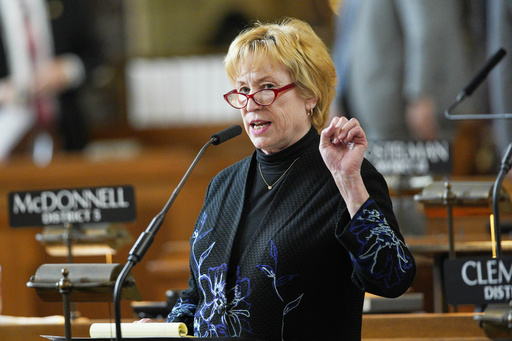Nebraska lawmakers are on track to pass a bill that would circumvent an upcoming ballot initiative in which voters could repeal a new state law that funds private school tuition with taxpayer money.
The bill from Omaha Sen. Lou Ann Linehan, the author of last year’s Opportunity Scholarships Act, advanced late Wednesday to a final round of debate, just a day after advancing from the first round of debate. It would change the way the private school scholarships, enacted last year, are funded.
The law passed last year by Nebraska’s officially nonpartisan Legislature did not appropriate taxpayer dollars directly to private school tuition. Instead, it allowed businesses and individuals to donate as much as $100,000 per year of their owed state income tax to nonprofit organizations that award private school tuition scholarships. Estates and trusts could donate as much as $1 million a year. That dollar-for-dollar tax credit is money that would otherwise go into the state’s general revenue fund.
The law triggered an immediate pushback from public school advocates who blasted the measure as a “school voucher scheme” that would hurt enrollment, and therefore funding, for public schools and would allow taxpayer dollars to go to private schools that are allowed under religious tenets to discriminate against LGBTQ+ students.
Those critics organized a petition drive to ask voters to repeal the law, and the drive collected far more signatures than needed to get the question on the November ballot.
Acknowledging that voters might reject the new law, Linehan, a Republican, is now pushing a bill that would directly fund the private school scholarships from state coffers, thereby rendering moot any vote on a repeal of last year’s law. The move drew renewed protests from opponents.
Jenni Benson, president of the state’s largest teachers union and a leader of the petition initiative, called Linehan’s new bill “a slap in the face to the 117,415 Nebraskans who signed the successful referendum petition to have voters decide the issue on the November ballot.”
Some lawmakers said Linehan’s new bill violates the Nebraska Constitution, which explicitly forbids the appropriation of public funds to nonpublic schools. Linehan countered that direct funding is allowed under a 1984 Nebraska Supreme Court ruling that allowed state funds to be used for scholarships at either public or private colleges.
“The voters deserve an opportunity to be heard on this,” Omaha Sen. John Cavanaugh, a Democrat, said Tuesday during debate. “I disagree with the idea that we’re going to interject ourselves between the petition process and the voters before they have their opportunity to be heard.”
Wednesday night’s debate went much the way Tuesday’s had, with proponents of the bill saying their intent was to give students whose parents might not otherwise be able to afford it to a choice to go to a private school if their public school is failing them. Opponents maintained that voters should get the right to decide if they want public dollars to be reserved for public schools.
“Let’s not do tricks to try to repeal bills once a referendum comes through,” said Sen. Wendy DeBoer, a Democrat, said Wednesday night. “Let’s let the people of Nebraska decide.”
Linehan’s effort to rejigger the bill has not been without struggle. She drastically lowered the amount allocated in last year’s measure using tax credits, which had allotted $25 million this year and in 2025, and up to $100 million annually thereafter to cover such donations. She dropped that amount to $10 million a year, with no escalation in the future, in an effort to secure more votes.
She got just enough votes to end a filibuster and advance the bill both Tuesday and Wednesday. It is likely to get enough votes to get through a final round of debate and pass before the end of the session’s last day on April 18.
This website uses cookies so that we can provide you with the best user experience possible. Cookie information is stored in your browser and performs functions such as recognising you when you return to our website and helping our team to understand which sections of the website you find most interesting and useful.
